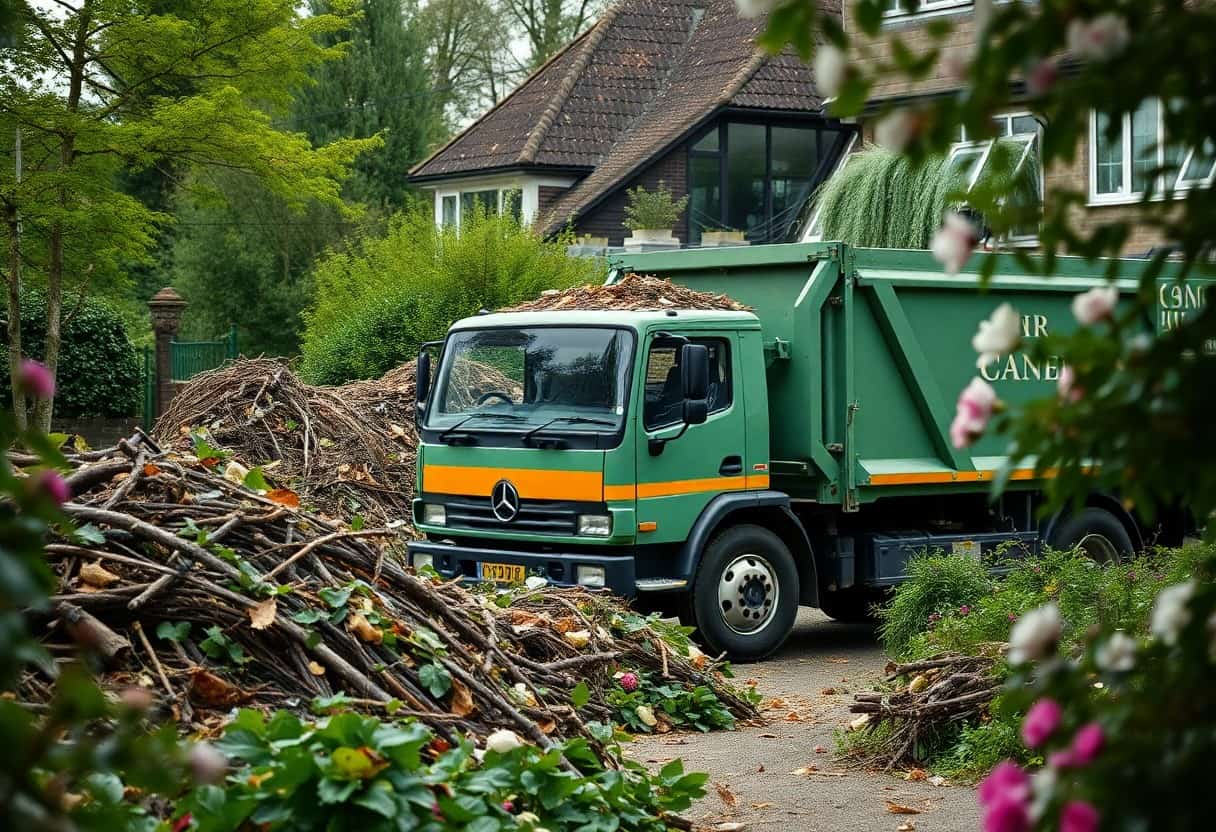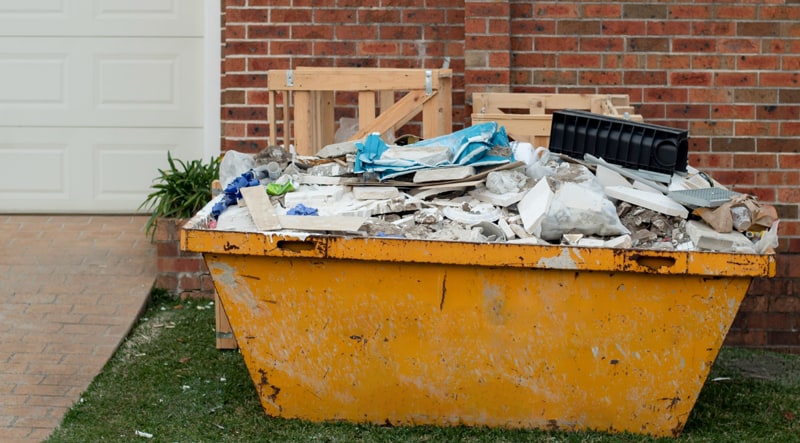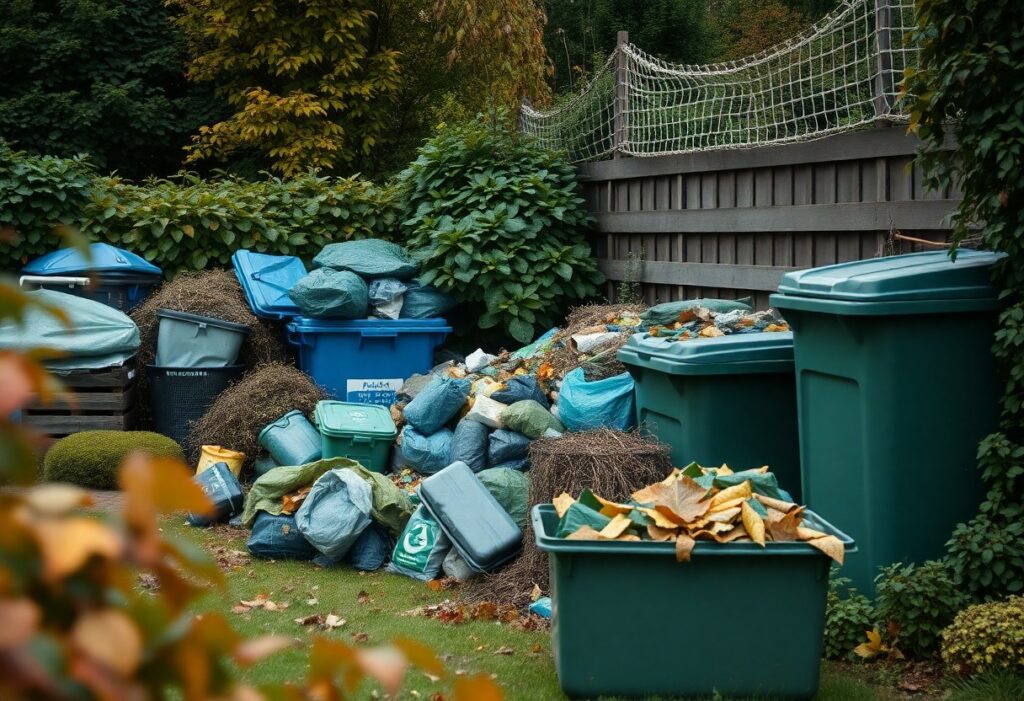Most homeowners in Surrey face the challenge of managing garden waste effectively. This guide provides you with all the imperative information you need to efficiently remove garden debris and keep your outdoor space tidy. From local disposal options to environmentally-friendly practices, you will learn how to make the process smooth and stress-free. By understanding your responsibilities and the best methods available, you can maintain your garden while contributing positively to the environment. Let’s examine the details!

Types of Garden Waste
To effectively manage your garden and keep it tidy, it’s important to understand the various types of garden waste you might encounter. Below is a breakdown of the main categories:
| Green Waste | Includes grass clippings, leaves, and pruned branches. |
| Hard Waste | Consists of non-biodegradable items like soil and stones. |
| Hazardous Waste | Comprised of chemicals and other dangerous materials. |
| Organic Waste | Food scraps and other biodegradable materials. |
| Miscellaneous Waste | Odd items that do not fit into other categories. |
Green Waste
Some of the most common types of green waste in your garden include grass clippings, fallen leaves, and soft pruning materials from shrubs and hedges. These materials are biodegradable and can be composted or mulched to enrich your garden soil.
Hard Waste
Types of hard waste include bulky items such as soil bags, bricks, and stones. These materials often require specific disposal methods, as they are not suitable for composting.
It’s important to consider that hard waste can occupy a lot of space and may often need specialised vehicles or services for removal. If you plan to undertake any renovation projects or landscaping, ensuring proper disposal of hard waste will help maintain a clean and organised garden space.
Hazardous Waste
Even though you may not encounter hazardous waste frequently, it’s vital to identify and handle it correctly. This category includes items like paints, pesticides, and batteries, which poses risks if not managed appropriately.
Waste containing toxic chemicals can be harmful to both the environment and your health. It’s imperative that these items are disposed of at designated hazardous waste collection points to prevent contamination and protect local wildlife.

Tips for Effective Garden Waste Removal
You can streamline your garden waste removal process by following these tips:
- Sort your waste into categories such as compostable, recyclable, and general waste.
- Use appropriate containers to transport your waste efficiently.
- Schedule your removal to ensure minimal disruption.
- Consider hiring professionals for larger jobs.
- Explore local recycling options to reduce landfill waste.
After adopting these practices, your garden cleanup will become much more manageable.
Planning Your Cleanup
On your journey to a tidier garden, effective planning is vital. Begin by listing all tasks needed for your cleanup and gathering required tools. Having a systematic approach helps you prioritise what needs to be done first.
Proper Separation Techniques
Even though it may seem tedious, proper waste separation is vital for efficient garden waste removal. By segmenting your waste into distinct categories such as organic, recyclable, and landfill materials, you enhance recycling opportunities and promote environmental responsibility.
Cleanup should involve a well-structured approach to waste separation. This process allows you to effectively dispose of different materials, ensuring that organic waste can be composted, while recyclables are sent to the appropriate facilities. Additionally, separating toxic or hazardous materials like pesticide containers is vital, as improper disposal can lead to serious environmental issues. By adopting these proper separation techniques, not only do you make waste disposal easier, but you also contribute positively to the sustainability of your community.
Step-by-Step Guide to Garden Waste Disposal
All garden waste must be disposed of properly to promote a cleaner environment. Follow this step-by-step guide to ensure you manage your garden refuse responsibly. For efficient disposal, you can explore Garden waste collection services offered in Surrey.
| Step | Description |
|---|---|
| 1 | Preparing Your Space |
| 2 | Collecting and Sorting Waste |
| 3 | Choosing the Right Disposal Method |
Preparing Your Space
Waste management begins with preparing your garden area. Clear a space to gather all your organic refuse, such as leaves, branches, and grass clippings. This makes it easier for you to sort through the waste and decide on the appropriate disposal method.
Collecting and Sorting Waste
One of the key steps in waste disposal is collecting and sorting your garden refuse. Begin by categorising your waste into green waste, soil, and debris. This helps streamline the disposal process and ensures that you are following local regulations.
StepbyStep sorting is beneficial for efficient waste management. Place green waste into one pile, while separating any hard waste or recyclable items. If you have hazardous materials, ensure they are stored safely and reported to your local waste management service for appropriate handling.
Choosing the Right Disposal Method
Little thought goes into selecting a disposal method, yet it significantly affects the environment. You must consider options like composting, recycling, or utilising a collection service to ensure responsible disposal.
It is imperative to be aware of all disposal choices available to you. Composting can turn organic waste into valuable soil, while recycling can prevent harmful materials from ending in landfill. Opting for a collection service provides a hassle-free solution, allowing you to manage your garden waste sustainably and efficiently.
Factors to Consider for Garden Waste Removal
Once again, when planning for garden waste removal, there are several factors to consider to ensure a smooth process. You should evaluate your waste type, choose the right disposal method, check local services, and consider any associated costs. Each of these elements can significantly impact your experience. For additional guidance, you can visit How to deal with garden waste. Recognizing these factors will help you make more informed decisions.
Local Regulations
Garden waste disposal is often subject to various local regulations that you must adhere to. It is important to check with your local council for specific rules regarding collection schedules, permitted items, and any restrictions that may apply to garden waste removal services.
Environmental Impact
Any decision you make regarding garden waste disposal can significantly affect the environment. Improper disposal methods can contribute to landfill overflow and environmental pollution. Responsible disposal, like composting or recycling, can reduce your waste footprint, enrich the soil, and promote biodiversity.
It is necessary to manage your garden waste properly to mitigate potential harmful effects, such as air pollution from burning waste or contributing to landfill issues. By opting for practices like composting, you can create a beneficial resource for your garden and significantly lower your environmental impact. Additionally, being mindful of the materials you dispose of can help maintain the local ecosystem and encourage a greener lifestyle.
Pros and Cons of Different Disposal Methods
For anyone navigating garden waste removal in Surrey, understanding the pros and cons of various disposal methods is important. Below is a brief overview:
| Method | Pros | Cons |
|---|---|---|
| Council Collection | Convenient and reliable | Limited frequency |
| DIY Solutions | Cost-effective | Time-consuming |
| Local Recycling Centres | Eco-friendly | Transport required |
| Burning Waste | Quick disposal | Environmental hazards |
| Composting | Beneficial for soil | Requires space |
Council Collection Services
With council collection services, you have the advantage of a professional and systematic removal of your garden waste. Typically offered at scheduled intervals, these services provide a hassle-free option for disposing of large amounts of waste without needing to travel. However, you may find that the collection frequency does not necessarily match your disposal needs.
DIY Solutions
Now, implementing DIY solutions can be an efficient way to manage your garden waste in Surrey. You can choose to shred, mulch, or compost your green waste, effectively reducing your garden’s footprint while saving money on disposal fees.
Plus, opting for DIY methods allows you to engage with your garden more intimately, enhancing your gardening skills. You can create rich compost for your plants or mulch to improve soil health. However, be prepared to invest time and effort, as these methods can be hands-on and require regular maintenance.
Local Recycling Centres
Now, local recycling centres provide a responsible avenue for disposing of your garden waste, ensuring it gets processed properly. These centres accept various types of green waste and often offer beneficial services like composting and recycling.
Recycling your garden waste at local centres not only helps you adhere to waste regulations but also contributes positively to the environment. By using these facilities, you enable the recycling process, where waste can be transformed into useful products like compost or mulch, promoting sustainability in your community.
Frequently Asked Questions
Keep your garden clean and safe by addressing common concerns about garden waste removal. You may wonder how often you should dispose of waste or how to identify hazardous materials. It’s important to separate organic waste from non-organic items to avoid contamination. Additionally, hiring a professional service can streamline the process and ensure that your waste is handled responsibly. Always check local regulations to stay compliant and contribute to a greener environment.
To wrap up
Ultimately, with the insights from ‘The Ultimate Guide to Garden Waste Removal in Surrey’, you are now equipped to manage your garden waste efficiently and responsibly. Understanding your options—from local council services to private companies—will empower you to maintain your garden without the hassle of clutter. By making thoughtful choices regarding disposal, you can contribute to a cleaner environment while enhancing the beauty of your outdoor space. Embrace these practices to ensure your garden remains a serene retreat for you and your family.
FAQ
Q: What types of garden waste can I remove in Surrey?
A: In Surrey, you can remove a wide variety of garden waste including grass cuttings, leaves, branches, hedge trimmings, soil, and plant debris. It is important to check local regulations, as some areas may have specific guidelines regarding the disposal of certain items, such as large branches or soil.
Q: How can I dispose of large items like tree stumps or large branches?
A: For large items such as tree stumps or large branches, you may need to contact a local waste disposal service that offers bulk waste collection. Some local councils provide special collection services or drop-off points for large garden waste, so it’s advisable to inquire with your council about available options.
Q: Are there recycling options available for garden waste in Surrey?
A: Yes, Surrey offers several recycling options for garden waste. Many local councils provide green waste bins for residential properties which are collected regularly. Additionally, some recycling centres accept garden waste for composting. Check with your council for specific recycling services available in your area.
Q: Is there a charge for garden waste collection services in Surrey?
A: Charges for garden waste collection services vary by council in Surrey. Some councils offer free collection services, while others may have a nominal fee for regular garden waste collections or bulk item pickups. It is advisable to consult your local council’s website or contact them directly for detailed information on fees and services.
Q: What should I do if I have hazardous garden waste like chemical pesticides?
A: Hazardous garden waste, such as chemical pesticides or any other toxic materials, should never be disposed of with regular garden waste. Contact your local council for guidance on how to safely dispose of these materials. Many councils have specific hazardous waste collection days or designated drop-off points for safe disposal.



